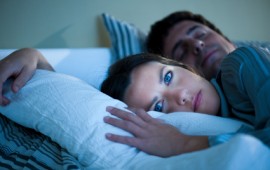Do’s and Don’ts for Insomnia
Author: Shannon Miller Lifestyle

You have had a long day, you are exhausted and you are looking forward to your head hitting that pillow and being able to get a good night’s sleep, but instead you lay there, eyes wide open, tossing and turning, unable to sleep.
Insomnia could be your problem.
About 30-40 percent of adults report having sleep problems. “Insomnia is so prevalent because there are so many misconceptions about it,” says Donnica Moore, MD, president of the Sapphire Women’s Health Group. Perhaps the most common misconception about insomnia is that “people don’t realize it’s a medical problem, and they don’t seek help,” she says. In fact, insomnia is important to get under control because “sleep is as important to health as a healthy diet or regular exercise,” Dr. Moore says.
Many times just some simple changes in lifestyle can help get your sleeping pattern back on track. Here are few “Do’s and Don’ts” that can help.
DO:
Talk you your doctor and get a medical evaluation to see if there is an under-lying medical problem that could be causing your insomnia or the possibility of a sleep disorder.
Get into a routine of trying to go to bed and wake up at the same time. This helps your body get into a schedule.
Get into your bed only when you are tired and actually ready to go to sleep.
Create an restful atmosphere in your bedroom. Keep it cool, dark and quiet. A fan or a white-noise machine works well to neutralize sound. Make it a comfortable place – where you are very, very relaxed.
Exercise regularly, but no later than three to five hours before bedtime. Exercise can wind you up and make it hard to get to sleep if you do it to close to your bedtime.
Take advantage of something relaxing, like yoga, soft music or a nice soak in a warm bath.
DON’T:
Keep the television or computer running in your bedroom. The light they create is very bright and doesn’t create that dark place that can help you to sleep better.
Drink to much. Alcohol is not a sleeping aid, and although it may help you fall asleep, it usually does not help you stay asleep.
Under-estimate the caffeine! Some people are much more sensitive to caffeine that others. Know your limit. Educate yourself on what foods and drinks contain caffeine. You would be surprised!
Eat a large meal right before you turn in. There are some light snacks that are good for you to partake in that are protein enriched. A slice of turkey for example, contains tryptophan, an amino acid that promotes sleep.
Stay in the bed if you cannot sleep. Get up, find something to occupy your mind that is relaxing. Then get back into bed once you feel sleepy again.
TIP: If you try these things and you are still experiencing difficulties with sleeping be sure to see your doctor to get evaluated.
Sweet Dreams!
Source: “Everyday Tips for Living with Insomnia”, everydayhealth.com/sleep/insomnia/tips
